More than 17 years after he slashed the throat of a teenage clerk while robbing a Montana video rental store, Zachary O'Neill says guilt overcame him and he tried to tell authorities he was the culprit.
But it was another three years after he first confessed in a psychiatric hospital, and later to sheriff's investigators, before the admitted drug addict and petty criminal appeared in state court for the 1998 murder of 18-year-old Miranda Fenner.
"I was wondering why they didn't even follow up and investigate," O'Neill said about his April 2016 confession at a psychiatric hospital in Spokane, Washington.
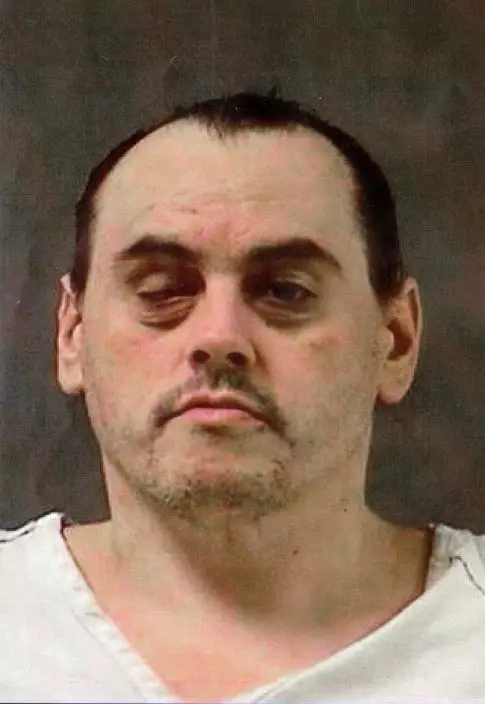
FILE - This undated file booking photo provided by the Yellowstone County Sheriff's Office shows Zachary David O'Neill. O'Neill is scheduled to be sentenced Friday, August 23, 2019 in the 1998 murder of an 18-year-old video store clerk in Laurel, Mont. (Yellowstone County Sheriff's Office via AP, File)
"They just told me I could go," O'Neill told The Associated Press in a jailhouse interview. "I was like, 'Alright, I tried and I'm done.'"
On Friday, O'Neill, 39, is expected to be sentenced to life in prison after pleading guilty last month to murder and the attempted killing and rape of another victim during the same time period.
O'Neill's assertion of a thwarted confession underscores a series of apparent missed opportunities for investigators over two decades.
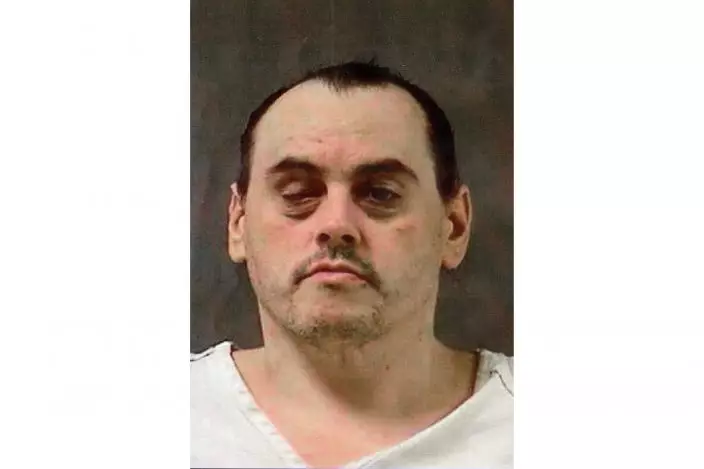
FILE - This undated file booking photo provided by the Yellowstone County Sheriff's Office shows Zachary David O'Neill. O'Neill is scheduled to be sentenced Friday, Aug. 23, 2019 in the 1998 murder of an 18-year-old video store clerk in Laurel, Mont. (Yellowstone County Sheriff's Office via AP, File)
Even after he walked into the Yellowstone County jail in 2017 and again claimed responsibility, he was not immediately arrested because authorities said they needed to check out his story. Detectives, who said they had little usable DNA evidence from the Fenner crime scene, took his DNA, released him and set out to confirm what he had told them.
Yellowstone County Attorney Scott Twito confirmed the hospital confession, but said O'Neill's story did not seem credible and he also claimed to have killed at least one other person who was still alive.
"It's easy to go back in hindsight and connect the dots. It's much harder to do that in the moment and as the years go by. You can't afford to get it wrong," Twito said.
O'Neill told investigators in 2017 that he "didn't care too much" at first about what he had done to Fenner. He said he was stealing to support his drug use and had smoked meth before renting several movies that night. After his mother learned one of the movies was pornographic she sent him back to return it. He said he decided to rob the store and then killed Fenner because he thought she might be able to identify him to police.
He was able to describe what Fenner was wearing and other details about the crime that were not released to the public, court records said.
After talking to authorities at the jail in 2017, O'Neill headed back to Spokane, where he was subsequently arrested for a burglary and being a felon in possession of a firearm. While he was being held for those crimes, Montana detectives had matched his DNA to two rape cases. He was returned to Montana in February 2019 to face charges.
Authorities said the case was complicated not only by a lack of DNA evidence in the Fenner case, but the fact that numerous other suspects falsely claimed responsibility or were implicated by others. O'Neill himself was interviewed by detectives early on but he pointed to others, said Twito and Yellowstone County Sheriff Mike Linder.
O'Neill's former stepfather, David Saylor, said in the days following the crime he told a detective O'Neill had been at the video store in Laurel just minutes before Fenner's killing. "I said: 'If he didn't do it, he damn well knew who did,'" Saylor said.
Laurel Detective Joel Sauter said hundreds of people had been interviewed over the years but he had never heard of Saylor's claim.
In 2013, David Saylor's wife Beverly told authorities she suspected O'Neill was involved.
She told a detective that O'Neill had rented movies from the video store the night Fenner was killed. She said O'Neill was prone to violence and members of his family had suggested he was involved in several other violent crimes.
"It just seemed like there was more and more stuff that pointed at him," she said. "I thought, somebody has to know this. It's not right."
Detective Shane Bancroft said at the time there was no evidence linking O'Neill to Fenner's death, court documents show.
O'Neill wasn't interviewed after the 2013 call from Saylor because investigators were focused on other suspects, Twito said.
Linder, the sheriff, defended his department's handling of the case. Investigators chased down numerous false leads over the years and needed to ensure they had a solid case before pursuing charges against O'Neill, he said.
"The big question is did we drop the ball along the way. My opinion is absolutely not. We followed up on what we had," Linder told AP. "I'll back them up 100% on this investigation."
Miranda Fenner's mother, Sherry, has said she is not talking about the case.
O'Neill said his step-brother's death in an April 2013 arson fire caused him to feel "shame and regret" and led to his attempts to confess, court documents show. Finally in March 2017, a friend drove O'Neill to the Yellowstone County jail.
He broke down crying when he told officers how he cut Fenner's throat. He has also admitted to the rape and attempted murder of a newspaper carrier and a second rape, both in the months before Fenner's murder.
The victim in the second rape died in 2013 and no charges have been brought.
David Saylor said as a boy his stepson would steal sodas from a convenience store and later cash from at least one business. Over the years, the offenses escalated as O'Neill got involved in drugs and he grew increasingly violent. He lost an eye several years ago after being hit in the head with a baseball bat during a fight and has lost most of his teeth from years of smoking methamphetamine.
"He's just a bad person. You just look into his eye and he looked dead," David Saylor said. "I'm so ashamed I had anything to do with (his) upbringing."
Artificial intelligence. Abortion. Guns. Marijuana. Minimum wages.
Name a hot topic, and chances are good there's a new law about it taking effect in 2025 in one state or another.
Many of the laws launching in January are a result of legislation passed this year. Others stem from ballot measures approved by voters. Some face legal challenges.
Here's a look at some of the most notable state laws taking effect:
California, home to Hollywood and some of the largest technology companies, is seeking to rein in the artificial intelligence industry and put some parameters around social media stars. New laws seek to prevent the use of digital replicas of Hollywood actors and performers without permission and allow the estates of dead performers to sue over unauthorized AI use.
Parents who profit from social media posts featuring their children will be required to set aside some earnings for their young influencers. A new law also allows children to sue their parents for failing to do so.
New social media restrictions in several states face court challenges.
A Florida law bans children under 14 from having social media accounts and requires parental consent for ages 14 and 15. But enforcement is being delayed because of a lawsuit filed by two associations for online companies, with a hearing scheduled for late February.
A new Tennessee law also requires parental consent for minors to open accounts on social media. NetChoice, an industry group for online businesses, is challenging the law. Another new state law requires porn websites to verify that visitors are at least 18 years old. But the Free Speech Coalition, a trade association for the adult entertainment industry, has filed a challenge.
Several new California measures aimed at combating political deepfakes are also being challenged, including one requiring large social media platforms to remove deceptive content related to elections and another allowing any individual to sue for damages over the use of AI to create fabricated images or videos in political ads.
In a first nationally, California will start enforcing a law prohibiting school districts from adopting policies that require staff to notify parents if their children change their gender identification. The law was a priority for Democratic lawmakers who wanted to halt such policies passed by several districts.
Many states have passed laws limiting or protecting abortion rights since the U.S. Supreme Court overturned a nationwide right to the procedure in 2022. One of the latest is the Democratic-led state of Delaware. A law there will require the state employee health plan and Medicaid plans for lower-income residents to cover abortions with no deductible, copayments or other cost-sharing requirements.
A new Minnesota law prohibits guns with “binary triggers” that allow for more rapid fire, causing a weapon to fire one round when the trigger is pulled and another when it is released.
In Delaware, a law adds colleges and universities to a list of school zones where guns are prohibited, with exceptions for those working in their official capacity such as law officers and commissioned security guards.
Kentucky is becoming the latest state to let people use marijuana for medical purposes. To apply for a state medical cannabis card, people must get written certification from a medical provider of a qualifying condition, such as cancer, multiple sclerosis, chronic pain, epilepsy, chronic nausea or post-traumatic stress disorder. Nearly four-fifths of U.S. states have now legalized medical marijuana.
Minimum wage workers in more than 20 states are due to receive raises in January. The highest minimum wages will be in Washington, California and Connecticut, all of which will top $16 an hour after modest increases.
The largest increases are scheduled in Delaware, where the minimum wage will rise by $1.75 to $15 an hour, and in Nebraska, where a ballot measure approved by voters in 2022 will add $1.50 to the current minimum of $12 an hour.
Twenty other states still follow the federal minimum wage of $7.25 an hour.
In Oregon, using drugs on public transit will be considered a misdemeanor crime of interfering with public transportation. While the measure worked its way through the legislature, multiple transportation officials said drug use on buses and trains, and at transit stops and stations, was making passengers and drivers feel less safe.
In Missouri, law enforcement officers have spent the past 16 months issuing warnings to motorists that handheld cellphone use is illegal. Starting with the new year, penalties will kick in: a $150 fine for the first violation, progressing to $500 for third and subsequent offenses and up to 15 years imprisonment if a driver using a cellphone cause an injury or death. But police must notice a primary violation, such as speeding or weaving across lanes, to cite motorists for violating the cellphone law.
Montana is the only state that hasn't banned texting while driving, according to the National Conference of State Legislatures.
Tenants in Arizona will no longer have to pay tax on their monthly rent, thanks to the repeal of a law that had allowed cities and towns to impose such taxes. While a victory for renters, the new law is a financial loss for governments. An analysis by Arizona’s nonpartisan Joint Legislative Budget Committee estimated that $230 million would be lost in municipal tax revenue during the first full fiscal year of implementation.
Meanwhile Alabama will offer tax credits to businesses that help employees with child care costs.
Kansas is eliminating its 2% sales tax on groceries. It also is cutting individual income taxes by dropping the top tax rate, increasing a credit for child care expenses and exempting all Social Security income from taxes, among other things. Taxpayers are expected to save about $320 million a year going forward.
An Oklahoma law expands voting privileges to people who have been convicted of felonies but had their sentences discharged or commuted, including commutations for crimes that have been reclassified from felonies to misdemeanors. Former state Sen. George Young, an Oklahoma City Democrat, carried the bill in the Senate.
“I think it’s very important that people who have gone through trials and tribulations in their life, that we have a system that brings them back and allows them to participate as contributing citizens,” Young said.
Associated Press writers Trân Nguyễn in Sacramento, California; Kate Payne in Tallahassee, Florida; Jonathan Mattise in Nashville, Tennessee; Randall Chase in Dover, Delaware; Steve Karnowski in Minneapolis; Bruce Schreiner in Frankfort, Kentucky; Claire Rush in Portland, Oregon; Summer Ballentine in Jefferson City, Missouri; Gabriel Sandoval in Phoenix; Kim Chandler in Montgomery, Alabama; John Hanna in Topeka, Kansas; and Sean Murphy in Oklahoma City contributed.
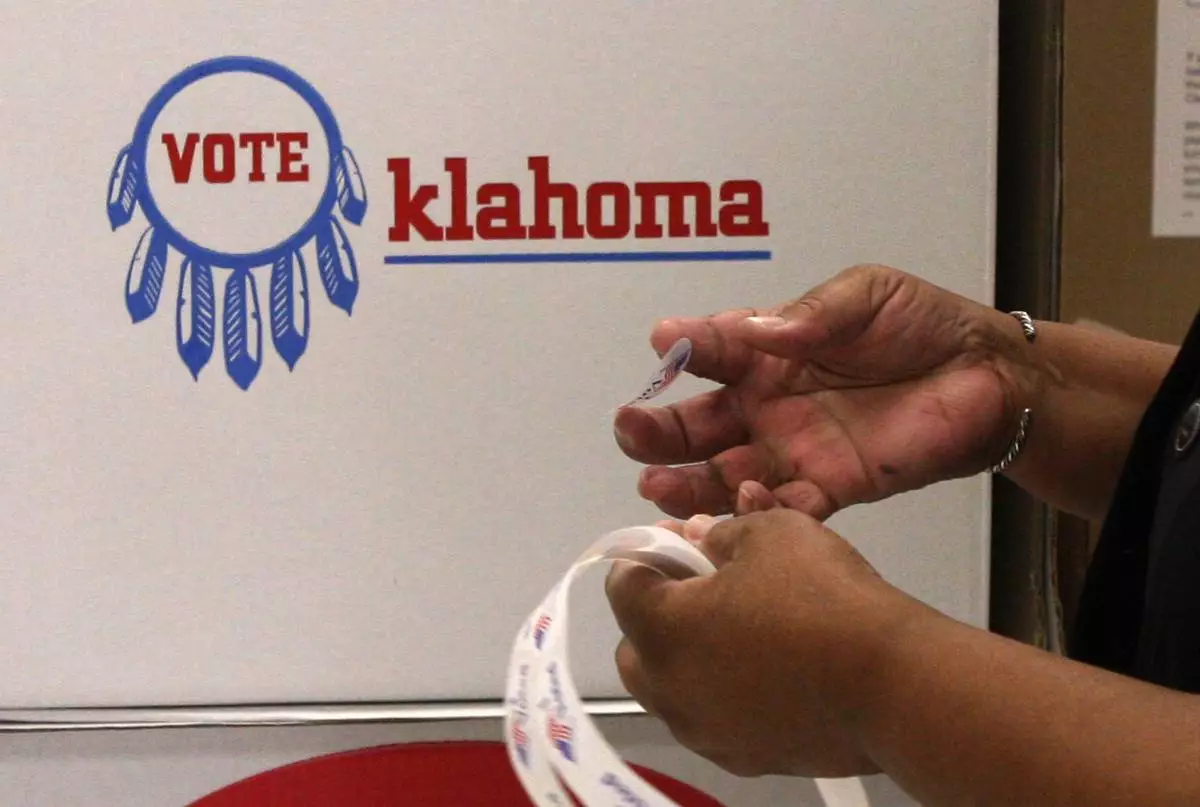
FILE - Election board inspector Pat Cook readies "I Voted" stickers for voters during early voting in Oklahoma City, Friday, Oct. 29, 2010. (AP Photo/Sue Ogrocki, File)

FILE - Surrounded by members of the legislature and signs touting saving families money, Kansas Gov. Laura Kelly announces her 'Axe the Food Tax' campaign at Dillons grocery store in Topeka, Kan., Monday, Nov. 8, 2021 by holding an axe. (Evert Nelson/The Capital-Journal via AP, File)

FILE - A man talks on his cell phone while driving in Los Angeles, Monday June 30, 2008. (AP Photo/Kevork Djansezian, File)

FILE - Seized firearms are displayed during a news conference Wednesday, Feb. 13, 2019, in Los Angeles. (AP Photo/Jae C. Hong, File)

FILE - Gov. Tim Walz speaks before a crowd gathered for a rally on the steps of the state Capitol in St. Paul, Minn., Wednesday evening, Aug. 7, 2019. Lt. Gov. Peggy Flanagan, center left, and his wife Gwen Walz, center right, stand by him. (Jeff Wheeler/Star Tribune via AP, File)
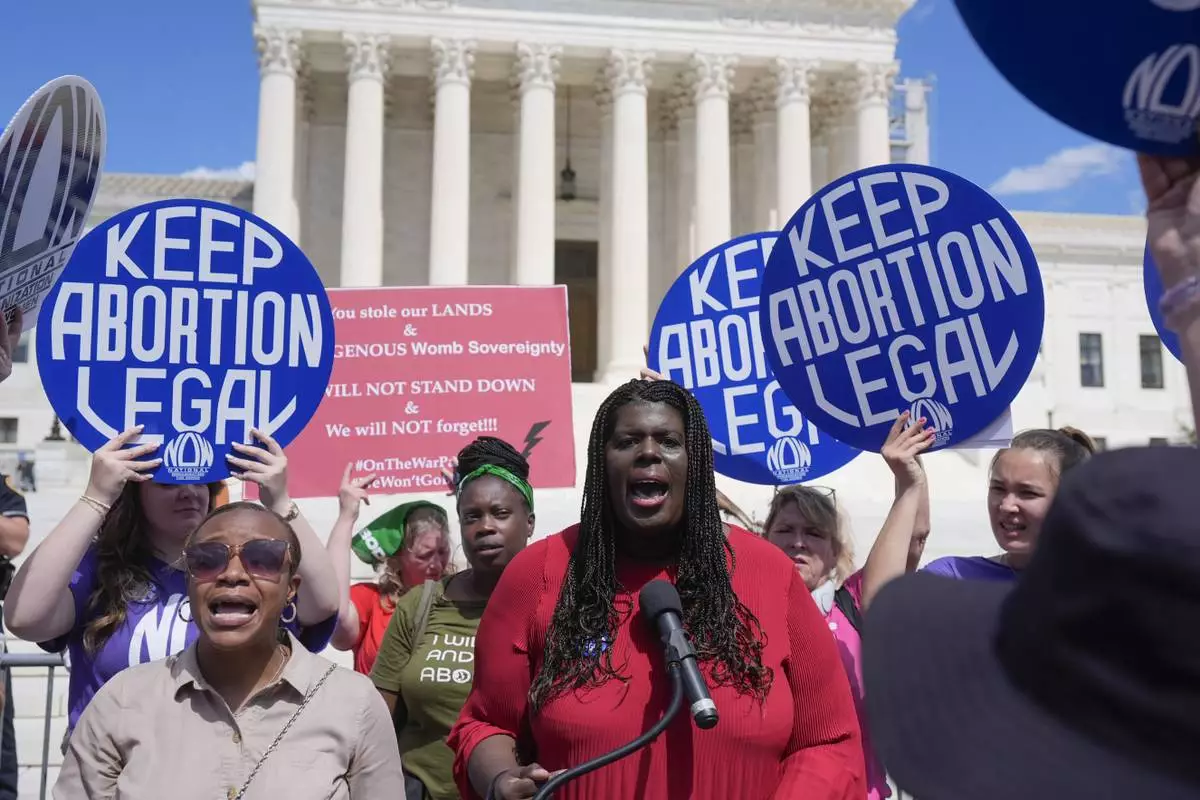
FILE - Christian F. Nunes, president of National Organization for Women speaks as abortion rights activists and Women's March leaders protest as part of a national day of strike actions outside the Supreme Court, Monday, June 24, 2024, in Washington. (AP Photo/Mark Schiefelbein, File)
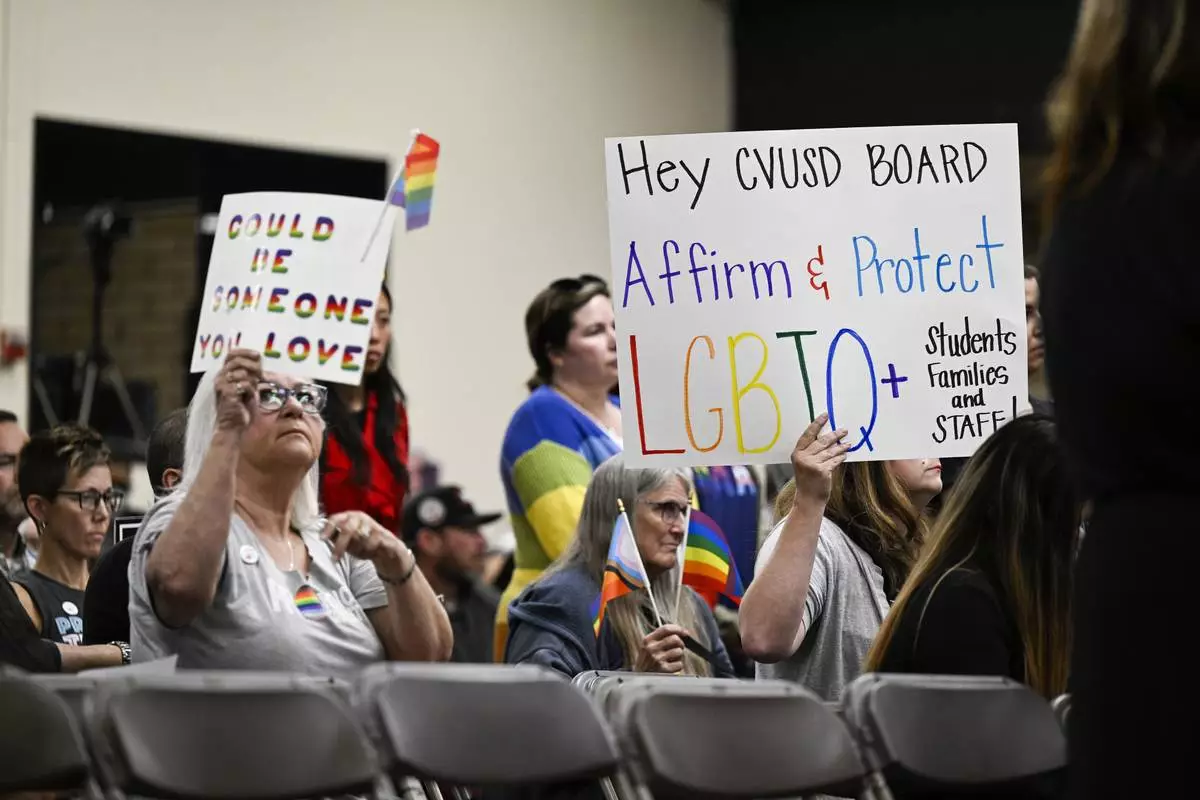
FILE - Parents, students, and staff of Chino Valley Unified School District hold up signs in favor of protecting LGBTQ+ policies at Don Antonio Lugo High School, in Chino, Calif., June 15, 2023. (Anjali Sharif-Paul/The Orange County Register via AP, File)

FILE - In advance of Instagram CEO Adam Mosseri's Congressional testimony, to illustrate the harms children face on social media, parent activists brought an "Instagrinch" to the Capitol building in Washington, Dec. 7, 2021. (Eric Kayne/AP Images for ParentsTogether, File)
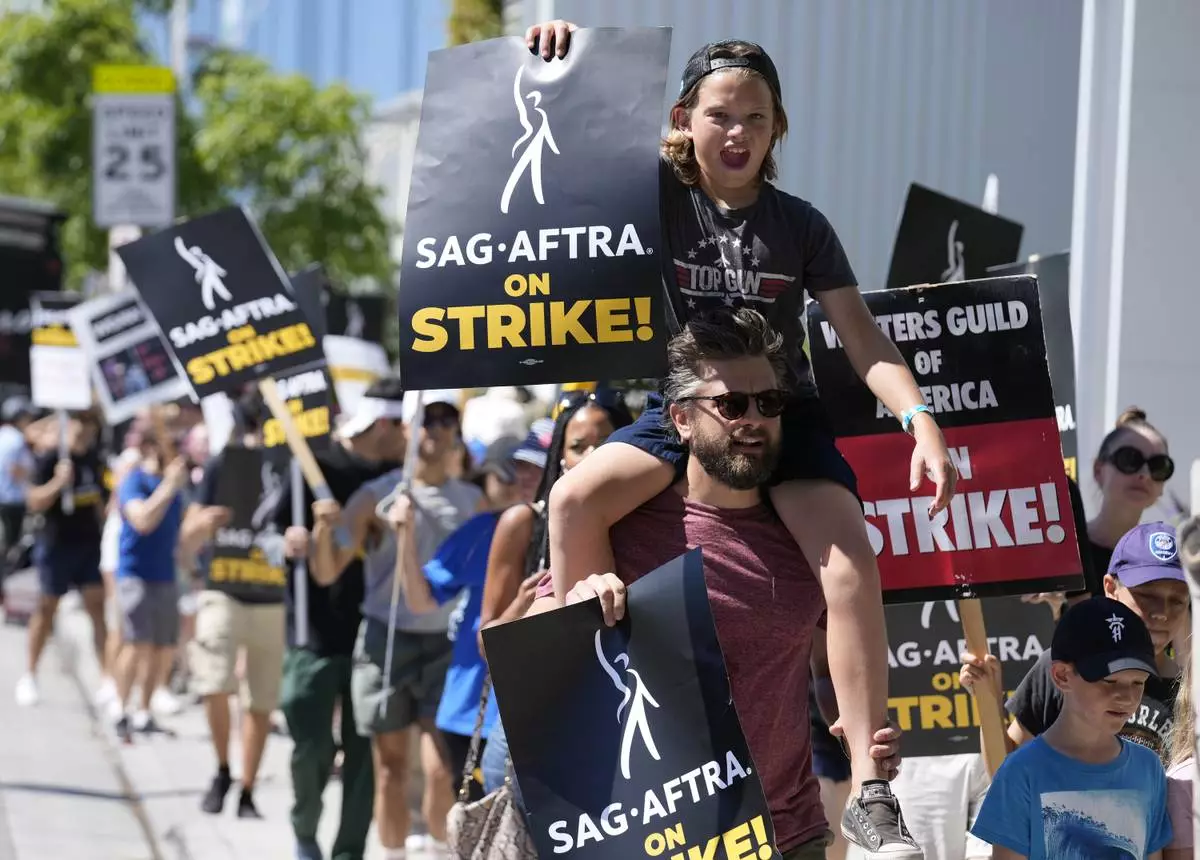
FILE - Director of Photography Jac Cheairs and his son, actor Wyatt Cheairs, 11, take part in a rally by striking writers and actors outside Netflix studio in Los Angeles on Friday, July 14, 2023. (AP Photo/Chris Pizzello, File)




















